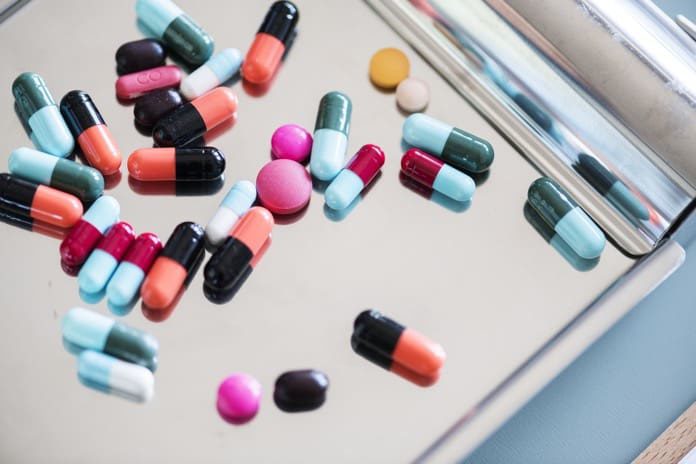Researchers analyzed the evidence from past trials examining gastroprotectant drugs in peptic ulcer disease to evaluate their overall benefits.
Peptic ulcer disease is most frequently caused by a Helicobacter pylori infection or non-steroidal anti-inflammatory drug (NSAID) use, such as aspirin. Peptic ulcer disease consists of gastric and duodenal ulcer types and is characterized by a break in the intestinal lining of the stomach, in the case of a gastric ulcer, or the first part of the small intestine, in a duodenal ulcer. Peptic ulcer disease can lead to a number of complications, including gastrointestinal bleeding, perforation, and in rare cases, an obstruction of the gastric outlet.
Treatment options for peptic ulcer disease
Gastroprotectant drugs, such as proton pump inhibitors (PPIs), prostaglandin analogues, and histamine-2 receptor antagonists H2RAs) are used to prevent peptic ulcer disease, to heal the damaged lining, and to treat bleeding complications.
Although proton pump inhibitors are currently recommended as the first choice of gastroprotectant drug, there is limited information on the effects of gastroprotectants in different clinical settings. To fill this gap in knowledge, researchers in the United Kingdom performed a meta-anlaysis of past trials and published their findings in The Lancet Gastroenterology & Hepatology.
The researchers searched and identified eligible trials between 1950 and 2015 that were unconfounded and included randomization to a gastroprotectant drug versus either a control or another gastroprotectant. A review of eligible trials revealed three main clinical settings that were assessed: a prevention trial with an absence of an ulcer at baseline, a healing trial that includes patients having a non-bleeding ulcer at baseline, and acute upper gastrointestinal bleeding treatment trials which include patients having an active gastrointestinal bleed at baseline.
Gastroprotectant drugs reduced the odds of an ulcer
A total of 1,212 trials were included in the meta-analysis. It revealed that in preventative trials, gastroprotectant drugs reduced the odds of getting an ulcer when compared to control. The effectiveness of gastroprotectant drugs also differed significantly in preventing gastric versus duodenal ulcers.
Proton pump inhibitors were the most effective in preventing duodenal ulcers followed by H2RAs and then prostaglandin analogues. Prostaglandin analogues were the most effective in preventing gastric ulcers, followed by proton pump inhibitors and H2RAs.
Gastroprotectant agents were also found to increase peptic ulcer disease healing, with proton pump inhibitors being the most effective, followed by H2RAs and finally prostaglandin analogues. When compared to H2RAs, proton pump inhibitors were also more effective in preventing further bleeding and the need for blood transfusions in those with active bleeding. The effects of the gastroprotectants were found to be similar regardless of NSAID use and there wasn’t one specific gastroprotectant drug found to be more effective than any other of the same class.
Study strengths and weaknesses
The study was strengthened by its ability to obtain an accurate estimate of the effects from the large number of events obtained from the large number of trials included. This also allowed for a diversity of inclusion criteria, which translates to the applicability of the findings to a broad range of patients at risk for peptic ulcer disease. However, the study is limited by the lack of large trials that recorded complications, as these trials were all short term and only recorded a small number of bleeding complications.
Additionally, the study couldn’t analyze the influence of H. pylori or other antithrombotic drugs on the effectiveness of gastroprotectants in peptic ulcer disease. Finally, there are concerns regarding long-term safety with the use of these drugs, as proton pump inhibitors have been linked to an increased risk of heart attacks, bone fractures, dementia, and chronic kidney disease. However, the results of an ongoing sub-study of the COMPASS trial will hopefully provide more information on the long-term safety of proton pump inhibitors, and allow for a more accurate assessment of its magnitude of benefit.
Overall, the meta-analysis concludes that gastroprotectant drugs are effective in peptic ulcer disease prevention and treatment in a large range of different clinical scenarios, with proton pump inhibitors appearing to be the most effective drug class.
Written by Maggie Leung, PharmD
Reference: Kuipers, E. J. (2018 Feb 20). PPIs for prevention and treatment of peptic ulcer. The Lancet Gastroenterology & Hepatology, 3(4), 214-215. doi:10.1016/s2468-1253(18)30047-5



